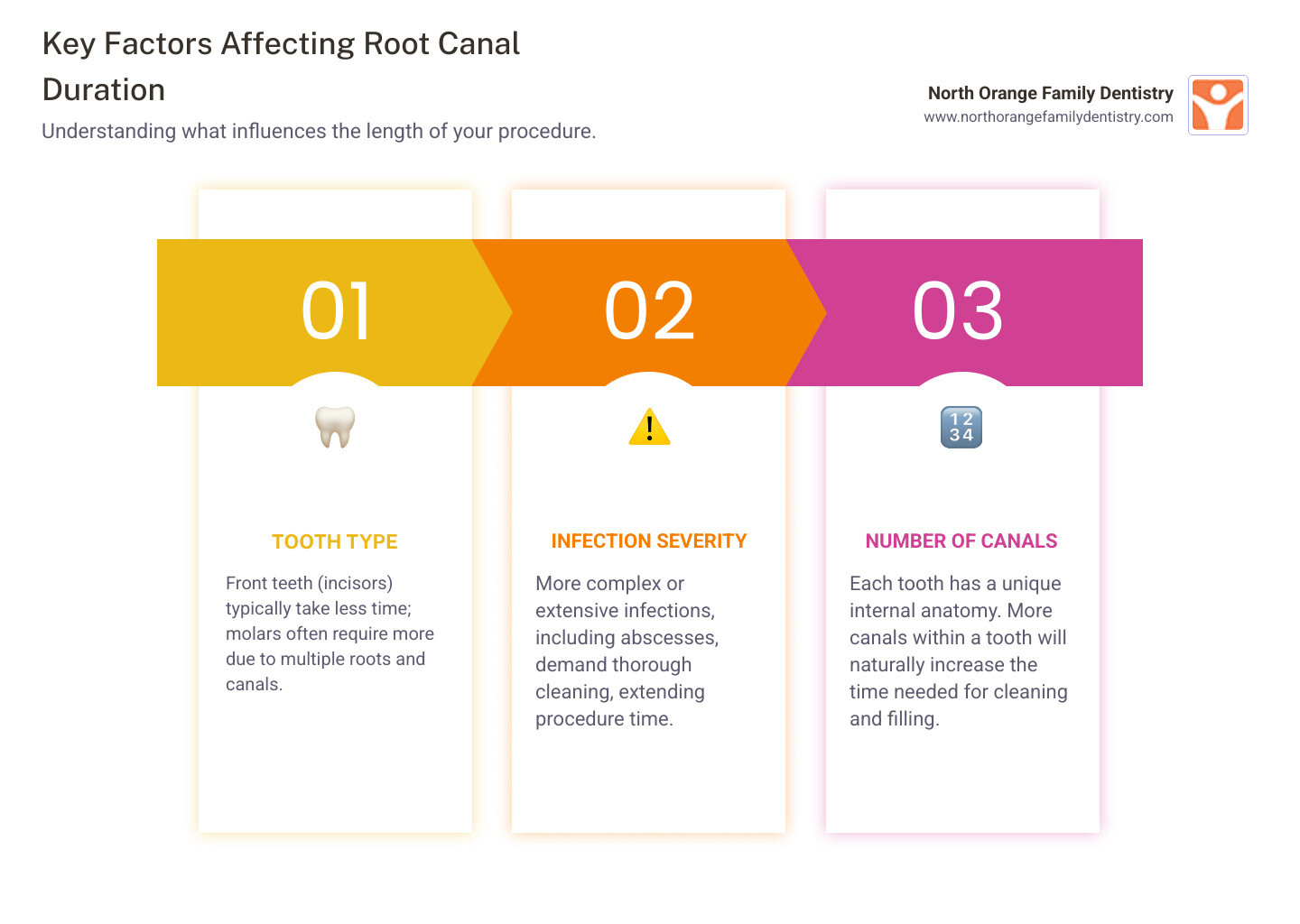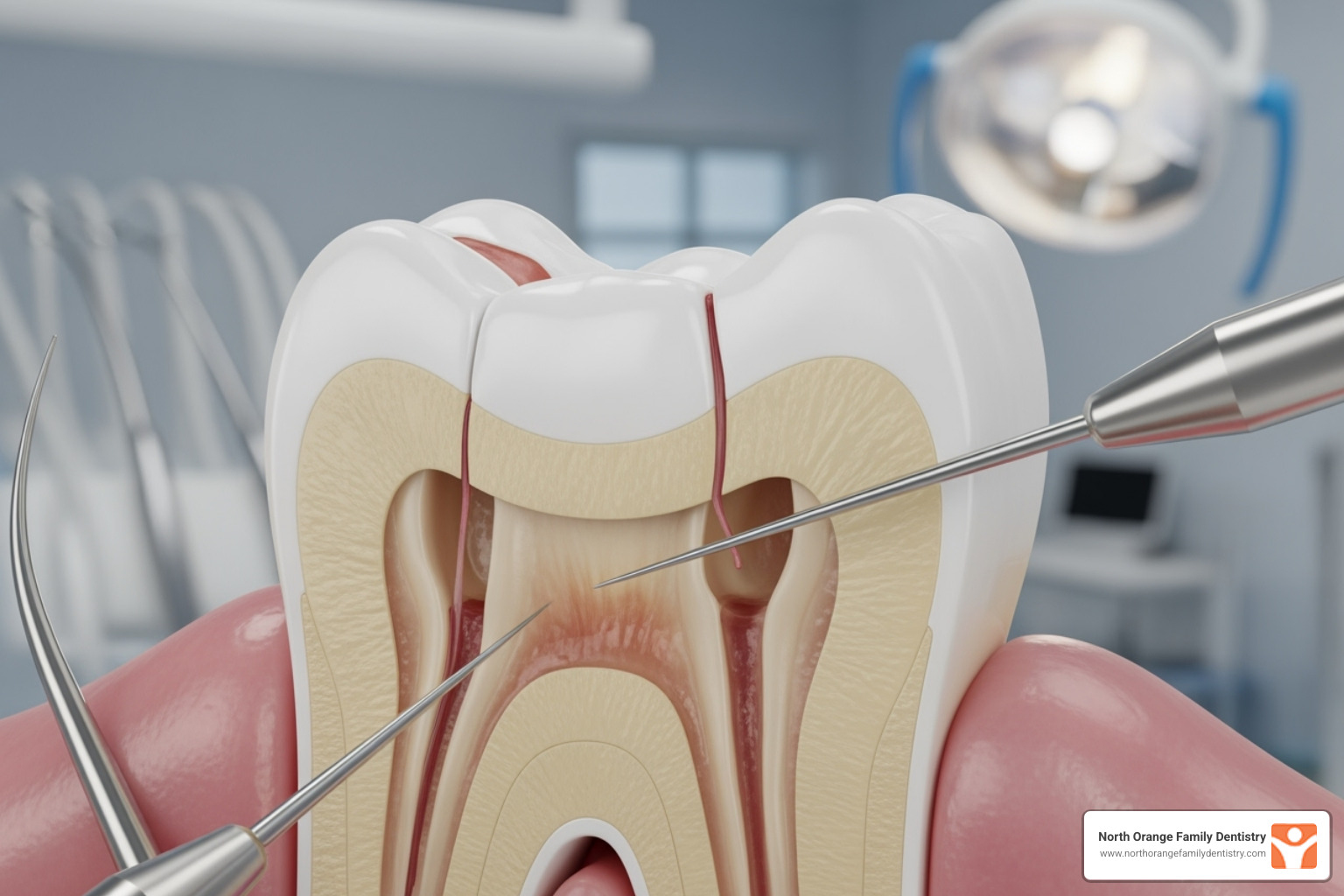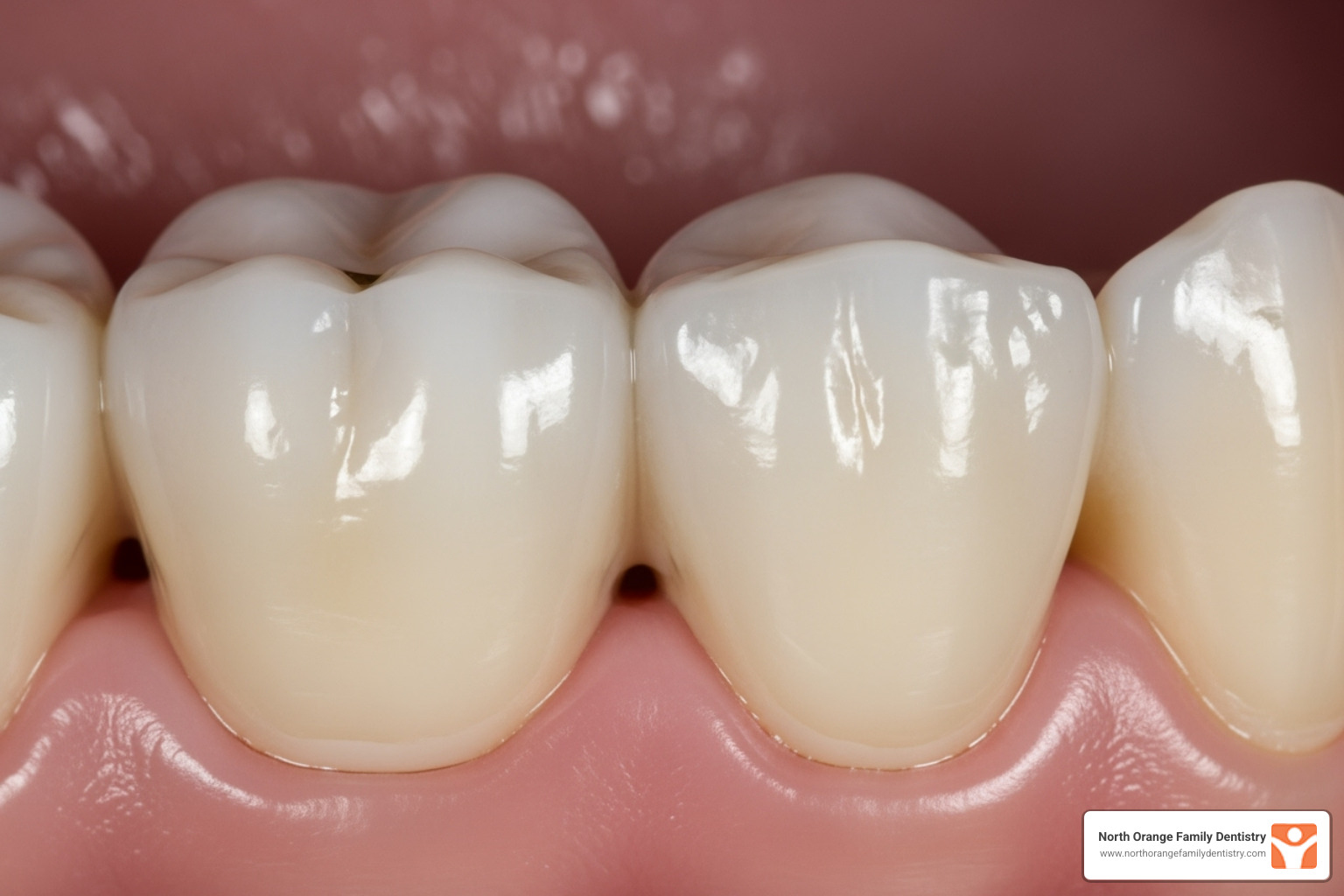
Tick Tock Tooth: How Long Does a Root Canal Really Take?
Discover how long do root canals take. Get a step-by-step timeline, factors affecting duration, and recovery tips.


Decoding the Root Canal Clock: What to Expect
A root canal procedure usually takes 30 to 90 minutes. Here's a quick look at typical times:
- Front Teeth (Incisors & Canines): 30 to 60 minutes
- Premolars: 60 to 90 minutes
- Molars: 90 minutes or more
Most root canals are done in one visit, but complex cases might need two appointments.
If you're wondering how long do root canals take, you're not alone. Many patients worry about the time they'll spend in the dental chair. A root canal is a common treatment to save a tooth with an infected pulp—the soft inner tissue containing nerves and blood vessels. When the pulp becomes infected or damaged, a root canal removes the affected tissue, preventing further problems and saving your natural tooth.
With modern tools and techniques, the procedure is often quicker and more comfortable than people expect. I'm Dr. Kyle Bogan, and as a general dentist, I know that questions about treatment time can cause worry. My goal is to ensure every patient understands their treatment fully.

At North Orange Family Dentistry, we create a comfortable and supportive atmosphere. We understand that no one wants a root canal, but it's often the best way to relieve pain and save your tooth. We're here to guide you through the process, making it as smooth and stress-free as possible.
How Long Do Root Canals Take? A Step-by-Step Timeline
When you're facing a root canal, it's normal to wonder about the time involved. The good news is that modern procedures are often quicker and more comfortable than you might think.
What factors determine how long a root canal takes?
The time a root canal takes depends on a few key factors.
Tooth Location and Number of Canals: The type of tooth is a primary factor because different teeth have a varying number of root canals.
- Front Teeth (Incisors and Canines): These teeth are the quickest to treat as they typically have only one canal, simplifying the cleaning and filling process.
- Premolars: Located between the front teeth and molars, premolars often have one or two canals, requiring more time.
- Molars: The large chewing teeth at the back are the most complex. Molars can have three, four, or even more canals, which may be curved or narrow, making them the most time-consuming to treat.

Severity of Infection: A mild infection takes less time to clean than a widespread, long-standing one. A severe infection or a dental abscess may require more extensive cleaning and disinfection, potentially extending the procedure or requiring a second visit. Our priority is always thoroughness to ensure the infection is completely eliminated. Learn more about our Dental Abscess Treatment.
Anesthesia and Preparation: We factor in about 10-15 minutes for local anesthesia to take full effect and for preparation. We ensure you are completely numb and comfortable before we begin, making the experience similar to getting a simple filling.
The Procedure Timeline: From Numbing to Sealing
Understanding the steps of a root canal can help ease any worries about the time involved. Here’s a breakdown of the process:
- Numbing the Area: We administer local anesthesia to numb the tooth and surrounding area, ensuring you won't feel pain during the procedure.
- Isolating the Tooth: A small rubber sheet, or dental dam, is placed around the tooth to keep it clean, dry, and protected from bacteria in your saliva.
- Creating an Opening: A tiny opening is made in the crown of the tooth to access the infected pulp chamber and root canals.
- Removing the Pulp: Using fine instruments, we carefully remove the infected or damaged pulp tissue, which is the source of the pain and infection.
- Cleaning and Disinfecting: The inside of the root canals is thoroughly cleaned, shaped, and disinfected with special solutions to remove all bacteria and debris.
- Filling the Canals: The clean, dry canals are filled with a rubber-like material called gutta-percha to seal them and prevent reinfection.
- Sealing the Tooth: A temporary filling is placed in the opening to protect the tooth until a permanent restoration, like a crown, can be placed.
How long do root canals take for different teeth?
The type of tooth is one of the biggest factors in procedure time. This table summarizes the typical time estimates for a single-visit root canal:
| Tooth Type | Typical Number of Canals | Estimated Procedure Time (Single Visit) |
|---|---|---|
| Front Teeth (Incisors & Canines) | 1 | 45 - 60 minutes |
| Premolars | 1-2 | 60 - 90 minutes |
| Molars | 3-4 (or more) | 90 minutes or more |
Note: These are general estimates. Your actual time can vary based on your tooth's unique anatomy and complexity.
As you can see, simpler front teeth are quicker, while complex molars with multiple canals take the longest. In some challenging cases, a molar root canal may take longer or require a second visit. Our team uses advanced technology to handle these complexities efficiently, always prioritizing the long-term health of your tooth.
One Visit vs. Two: Why Some Root Canals Take Longer
While many root canals are completed in a single visit, some may require two appointments. This decision is based on the tooth's condition and complexity, not a sign of a problem.
- Single-Visit Treatment: This is common for straightforward cases with mild infection and simple anatomy. We aim to complete treatment in one visit whenever possible.
- Multiple-Visit Treatment: A second visit may be necessary for several reasons:
- Severe Infection: If an abscess is present, we may clean the tooth and place an antibacterial medication inside it. This allows the infection to heal before we permanently seal the canals in a second appointment.
- Complex Anatomy: Teeth with very curved, narrow, or calcified canals may require more time to clean thoroughly, making two shorter visits a better option.
- Patient Comfort: For long procedures, some patients prefer to split the treatment into two more manageable sessions.
The decision is always made to ensure the best possible outcome. For more information, dental research offers More on single vs. multiple visits.
We know tooth pain can be an emergency. That's why we offer Emergency Dentist Ohio services and can often see patients the same day to provide relief.
Beyond the Chair: Recovery, Aftercare, and Final Steps
Congratulations! Once your root canal is done, the journey gets much smoother. This next phase focuses on recovery, aftercare, and the final restoration to protect your tooth.
How long does it take to recover from a root canal?
Most people are pleasantly surprised by how quickly they recover from a root canal. You'll likely feel numb for a few hours afterward, and it's best to wait until the feeling returns before eating. Mild soreness or sensitivity is normal for a few days and can be managed with over-the-counter pain relievers. Most patients feel back to normal within a week.
For a smooth recovery, follow these simple post-treatment care tips:
- Eat soft foods for the first few days. Find ideas on what to eat after oral surgery.
- Avoid chewing on the treated tooth until it has its permanent restoration.
- Maintain good oral hygiene, brushing and flossing gently around the area.
- Avoid smoking, as it can slow healing.
- Attend all follow-up appointments for monitoring and final restoration.
Modern techniques make recovery straightforward. If you have concerns, we can also help you explore the facts and myths about whether Are Root Canals Bad For You? and provide general Tooth Pain Relief advice.
The Final Restoration: Do I Need a Crown?
A root canal can make a tooth more fragile. To protect it from fracture, a final restoration is needed. Often, this is a dental crown.

A dental crown is a protective cap that covers the tooth, providing structural support and preventing it from breaking under chewing forces. It also restores the tooth's original shape, function, and natural appearance.
Whether a crown is necessary depends on the tooth's location:
- Back Teeth (Molars and Premolars): A crown is almost always recommended for these chewing teeth, as they are highly vulnerable to fracture after a root canal.
- Front Teeth (Incisors and Canines): If the tooth has enough healthy structure remaining, a permanent filling may suffice. However, a crown might be recommended for strength or aesthetic reasons, as treated teeth can sometimes darken.
At North Orange Family Dentistry, we use Advanced Dentistry techniques to create custom crowns that fit perfectly and blend seamlessly with your smile. We are committed to making quality care affordable. For patients without dental insurance, our Dental Wellness Plan offers a way to receive yearly care, including restorations like crowns, at a discounted price. It's our commitment to accessible care for the Lewis Center, Ohio community.
We will discuss your specific needs to determine the best restoration, ensuring your tooth stays healthy and strong for years to come.
Decoding the Root Canal Clock: What to Expect
A root canal procedure usually takes 30 to 90 minutes. Here's a quick look at typical times:
- Front Teeth (Incisors & Canines): 30 to 60 minutes
- Premolars: 60 to 90 minutes
- Molars: 90 minutes or more
Most root canals are done in one visit, but complex cases might need two appointments.
If you're wondering how long do root canals take, you're not alone. Many patients worry about the time they'll spend in the dental chair. A root canal is a common treatment to save a tooth with an infected pulp—the soft inner tissue containing nerves and blood vessels. When the pulp becomes infected or damaged, a root canal removes the affected tissue, preventing further problems and saving your natural tooth.
With modern tools and techniques, the procedure is often quicker and more comfortable than people expect. I'm Dr. Kyle Bogan, and as a general dentist, I know that questions about treatment time can cause worry. My goal is to ensure every patient understands their treatment fully.

At North Orange Family Dentistry, we create a comfortable and supportive atmosphere. We understand that no one wants a root canal, but it's often the best way to relieve pain and save your tooth. We're here to guide you through the process, making it as smooth and stress-free as possible.
How Long Do Root Canals Take? A Step-by-Step Timeline
When you're facing a root canal, it's normal to wonder about the time involved. The good news is that modern procedures are often quicker and more comfortable than you might think.
What factors determine how long a root canal takes?
The time a root canal takes depends on a few key factors.
Tooth Location and Number of Canals: The type of tooth is a primary factor because different teeth have a varying number of root canals.
- Front Teeth (Incisors and Canines): These teeth are the quickest to treat as they typically have only one canal, simplifying the cleaning and filling process.
- Premolars: Located between the front teeth and molars, premolars often have one or two canals, requiring more time.
- Molars: The large chewing teeth at the back are the most complex. Molars can have three, four, or even more canals, which may be curved or narrow, making them the most time-consuming to treat.

Severity of Infection: A mild infection takes less time to clean than a widespread, long-standing one. A severe infection or a dental abscess may require more extensive cleaning and disinfection, potentially extending the procedure or requiring a second visit. Our priority is always thoroughness to ensure the infection is completely eliminated. Learn more about our Dental Abscess Treatment.
Anesthesia and Preparation: We factor in about 10-15 minutes for local anesthesia to take full effect and for preparation. We ensure you are completely numb and comfortable before we begin, making the experience similar to getting a simple filling.
The Procedure Timeline: From Numbing to Sealing
Understanding the steps of a root canal can help ease any worries about the time involved. Here’s a breakdown of the process:
- Numbing the Area: We administer local anesthesia to numb the tooth and surrounding area, ensuring you won't feel pain during the procedure.
- Isolating the Tooth: A small rubber sheet, or dental dam, is placed around the tooth to keep it clean, dry, and protected from bacteria in your saliva.
- Creating an Opening: A tiny opening is made in the crown of the tooth to access the infected pulp chamber and root canals.
- Removing the Pulp: Using fine instruments, we carefully remove the infected or damaged pulp tissue, which is the source of the pain and infection.
- Cleaning and Disinfecting: The inside of the root canals is thoroughly cleaned, shaped, and disinfected with special solutions to remove all bacteria and debris.
- Filling the Canals: The clean, dry canals are filled with a rubber-like material called gutta-percha to seal them and prevent reinfection.
- Sealing the Tooth: A temporary filling is placed in the opening to protect the tooth until a permanent restoration, like a crown, can be placed.
How long do root canals take for different teeth?
The type of tooth is one of the biggest factors in procedure time. This table summarizes the typical time estimates for a single-visit root canal:
| Tooth Type | Typical Number of Canals | Estimated Procedure Time (Single Visit) |
|---|---|---|
| Front Teeth (Incisors & Canines) | 1 | 45 - 60 minutes |
| Premolars | 1-2 | 60 - 90 minutes |
| Molars | 3-4 (or more) | 90 minutes or more |
Note: These are general estimates. Your actual time can vary based on your tooth's unique anatomy and complexity.
As you can see, simpler front teeth are quicker, while complex molars with multiple canals take the longest. In some challenging cases, a molar root canal may take longer or require a second visit. Our team uses advanced technology to handle these complexities efficiently, always prioritizing the long-term health of your tooth.
One Visit vs. Two: Why Some Root Canals Take Longer
While many root canals are completed in a single visit, some may require two appointments. This decision is based on the tooth's condition and complexity, not a sign of a problem.
- Single-Visit Treatment: This is common for straightforward cases with mild infection and simple anatomy. We aim to complete treatment in one visit whenever possible.
- Multiple-Visit Treatment: A second visit may be necessary for several reasons:
- Severe Infection: If an abscess is present, we may clean the tooth and place an antibacterial medication inside it. This allows the infection to heal before we permanently seal the canals in a second appointment.
- Complex Anatomy: Teeth with very curved, narrow, or calcified canals may require more time to clean thoroughly, making two shorter visits a better option.
- Patient Comfort: For long procedures, some patients prefer to split the treatment into two more manageable sessions.
The decision is always made to ensure the best possible outcome. For more information, dental research offers More on single vs. multiple visits.
We know tooth pain can be an emergency. That's why we offer Emergency Dentist Ohio services and can often see patients the same day to provide relief.
Beyond the Chair: Recovery, Aftercare, and Final Steps
Congratulations! Once your root canal is done, the journey gets much smoother. This next phase focuses on recovery, aftercare, and the final restoration to protect your tooth.
How long does it take to recover from a root canal?
Most people are pleasantly surprised by how quickly they recover from a root canal. You'll likely feel numb for a few hours afterward, and it's best to wait until the feeling returns before eating. Mild soreness or sensitivity is normal for a few days and can be managed with over-the-counter pain relievers. Most patients feel back to normal within a week.
For a smooth recovery, follow these simple post-treatment care tips:
- Eat soft foods for the first few days. Find ideas on what to eat after oral surgery.
- Avoid chewing on the treated tooth until it has its permanent restoration.
- Maintain good oral hygiene, brushing and flossing gently around the area.
- Avoid smoking, as it can slow healing.
- Attend all follow-up appointments for monitoring and final restoration.
Modern techniques make recovery straightforward. If you have concerns, we can also help you explore the facts and myths about whether Are Root Canals Bad For You? and provide general Tooth Pain Relief advice.
The Final Restoration: Do I Need a Crown?
A root canal can make a tooth more fragile. To protect it from fracture, a final restoration is needed. Often, this is a dental crown.

A dental crown is a protective cap that covers the tooth, providing structural support and preventing it from breaking under chewing forces. It also restores the tooth's original shape, function, and natural appearance.
Whether a crown is necessary depends on the tooth's location:
- Back Teeth (Molars and Premolars): A crown is almost always recommended for these chewing teeth, as they are highly vulnerable to fracture after a root canal.
- Front Teeth (Incisors and Canines): If the tooth has enough healthy structure remaining, a permanent filling may suffice. However, a crown might be recommended for strength or aesthetic reasons, as treated teeth can sometimes darken.
At North Orange Family Dentistry, we use Advanced Dentistry techniques to create custom crowns that fit perfectly and blend seamlessly with your smile. We are committed to making quality care affordable. For patients without dental insurance, our Dental Wellness Plan offers a way to receive yearly care, including restorations like crowns, at a discounted price. It's our commitment to accessible care for the Lewis Center, Ohio community.
We will discuss your specific needs to determine the best restoration, ensuring your tooth stays healthy and strong for years to come.

Contact Us
Have any questions? Want to learn more?


